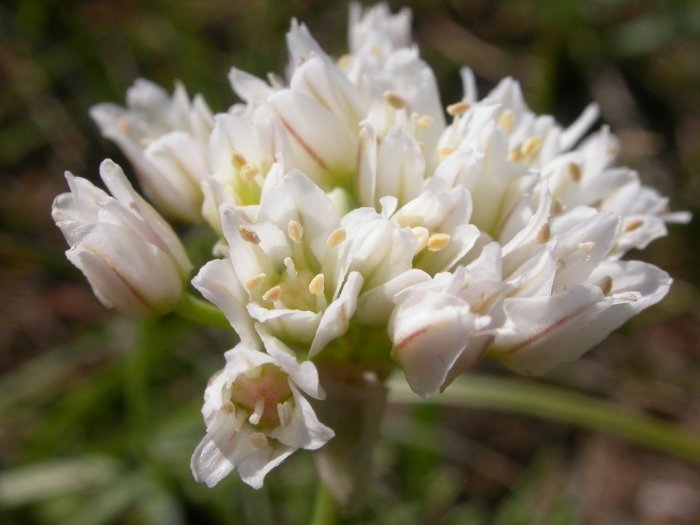Prairie Onion
(Allium textile)
Prairie Onion (Allium textile)
/
/

Matt Lavin
CC BY 4.0
Image By:
Matt Lavin
Recorded By:
Copyright:
CC BY 4.0
Copyright Notice:
Photo by: Matt Lavin | License Type: CC BY 4.0 | License URL: http://creativecommons.org/licenses/by/4.0/ | Rights Holder: Matt Lavin | Publisher: iNaturalist | Date Created: 2009-06-12T08:55:42-07:00 |

























Estimated Native Range
Summary
Allium textile, commonly known as prairie onion, is a perennial herb that is native to the prairies and dry upland areas of the Great Plains and Rocky Mountain regions of North America, ranging from Oklahoma to Montana and Minnesota, and extending west to Washington and northern New Mexico. It typically grows at elevations between 984 and 7874 feet. The plant produces egg-shaped bulbs up to 1 inch long and scapes that can reach up to 16 inches in height. During the flowering season from late spring to early summer, prairie onion displays clusters of bell-shaped flowers that are white or pink with distinctive reddish-brown midribs, which are quite showy and attract pollinators.
Prairie onion is valued for its ornamental flowers and its ability to thrive in tough conditions, making it suitable for rock gardens, native plant gardens, and xeriscaping. It is also used in culinary applications, as both the bulbs and the leaves are edible and have a mild onion flavor. In cultivation, prairie onion prefers full sun exposure and well-drained soils, and it is drought-tolerant once established. While generally low-maintenance, it can be susceptible to bulb rot if grown in poorly drained soils. This species is not typically associated with aggressive roots or significant disease problems. It is important to note that prairie onion should not be harvested from the wild, as it contributes to the biodiversity of its native ecosystems.CC BY-SA 4.0
Prairie onion is valued for its ornamental flowers and its ability to thrive in tough conditions, making it suitable for rock gardens, native plant gardens, and xeriscaping. It is also used in culinary applications, as both the bulbs and the leaves are edible and have a mild onion flavor. In cultivation, prairie onion prefers full sun exposure and well-drained soils, and it is drought-tolerant once established. While generally low-maintenance, it can be susceptible to bulb rot if grown in poorly drained soils. This species is not typically associated with aggressive roots or significant disease problems. It is important to note that prairie onion should not be harvested from the wild, as it contributes to the biodiversity of its native ecosystems.CC BY-SA 4.0
Plant Description
- Plant Type: Herb, Bulb
- Height: 0.5-1.5 feet
- Width: 0.5-1 feet
- Growth Rate: Rapid
- Flower Color: White
- Flowering Season: Spring, Summer
- Leaf Retention: Deciduous
Growth Requirements
- Sun: Full Sun, Part Shade
- Water: Medium
- Drainage: Fast, Medium, Slow
Common Uses
Bee Garden, Butterfly Garden, Deer Resistant, Drought Tolerant, Edible*Disclaimer: Easyscape's listed plant edibility is for informational use. Always verify the safety and proper identification of any plant before consumption., Groundcover, Low Maintenance, Rabbit Resistant, Rock Garden
Natural Habitat
Prairies and dry upland areas of the Great Plains and Rocky Mountain regions
Other Names
Common Names: White Wild Onion, Textile Onion, Wild Onion
Scientific Names: , Allium textile, Allium angulosum, Allium aridum, Allium geyeri var. textile, Allium reticulatum, Allium reticulatum, Allium reticulatum var. playanum, Maligia laxa,
GBIF Accepted Name: